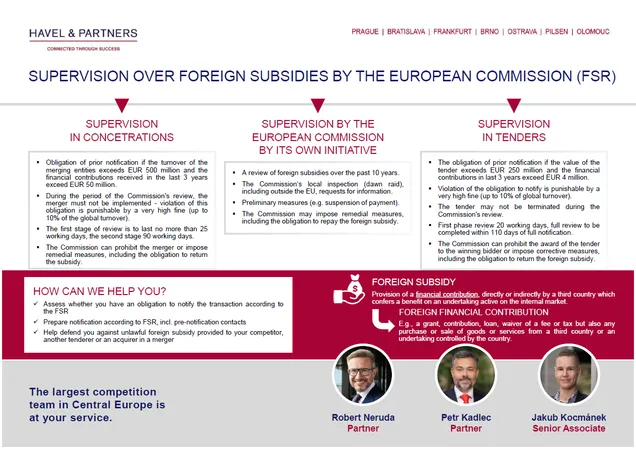The Foreign Subsidies Regulation celebrates the first anniversary of its applicability. It imposes far-reaching obligations on companies operating in the EU, in particular when participating in tenders or mergers. Evolving application practice provides guidance on how to proceed under this new regime.
Today is the first anniversary of the entry into force of the Foreign Subsidies Regulation (the content of which we summarised in our previous post), for which the acronym FSR has been adopted.
The European Commission (the “Commission”) has not yet published any guidance on the FSR and has so far only provided informal explanations in the form of Questions and Answers. For the time being, in our view, it can be assumed that the Commission will treat subsidies as equally as possible, whether they originate inside the EU (and are subject to the state aid law regime) or outside the EU and are subject to the FSR. The well-known principles and rules stemming from the Commission’s extensive decision-making practice in the field of state aid will therefore be used to interpret the FSR. These assumptions were confirmed by Mr Eddy De Smijter, Head of the Commission’s unit that decides on FSR cases, at this year’s conference of the Czech Competition Authority on state aid. We consider it positive that the Commission is committed to the interconnection of the two regimes.
Mr. De Smijter also confirmed our assumption that effective communication with the Commission in the pre-notification phase, i.e. informal contacts and exchange of information prior to the submission of a formal notification, will be particularly important for the success of a notification under the Foreign Subsidies Regulation. According to Mr De Smijter, the Commission makes every effort to ensure that subsidy notifications can be carried out quickly and efficiently, and the Commission responds to parties’ submissions within five working days as a matter of principle. Therefore, very good preparation will be necessary for the success of the notification, including the timely acquisition of all relevant information. Failure to do so entails the risk of a long series of submissions and the Commission’s requests for additional information.
The concept of foreign financial contribution is of key importance in the application of the Foreign Subsidies Regulation. The FSR defines this term very broadly. Financial contribution is understood to also include the provision of goods or services to an undertaking or the purchase of goods or services from an undertaking that is directly or indirectly controlled by a third country. The notification criteria of the FSR are linked to the volume of financial contributions received (which also include regular commercial transactions carried out on an arm’s length basis). This therefore creates pressure on undertakings involved in relevant public procurement or mergers to monitor all their transactions with third countries or entities controlled by third countries. However, identifying all foreign financial contributions may be disproportionately challenging in practice, precisely because all transactions, including ordinary purchases or sales of goods and services outside the EU, would need to be closely monitored.
As a precautionary measure, instead of monitoring all transactions, it is possible to notify all transactions where the other criteria are met. Hence, a turnover exceeding EUR 500 million in the case of concentrations between undertakings, and an expected value in excess of EUR 250 million in the case of a public contract. In the Commission’s view, the foreign financial contribution amount criterion (EUR 50 million for a merger and EUR 4 million for a public contract) can be assumed to be met in such large transactions involving foreign entities without the need to ascertain the exact amount of the financial contributions.
Mr De Smijter emphasised that the Commission will in principle only deal with financial contributions of more than EUR 1 million, which is the limit set in the FSR Implementing Regulation for the obligation to specifically describe financial contributions in the notification. This indication is useful because it confirms that it is possible to focus on these relatively large transactions when obtaining information for the purposes of FSR notification.
We continue to monitor developments in this area and, of course, provide comprehensive legal support in the area of the Foreign Subsidies Regulation (FSR).

More information
Article sources
- More information https://www.havelpartners.cz/wp-content/uploads/2024/07/fsr_en.pdf









